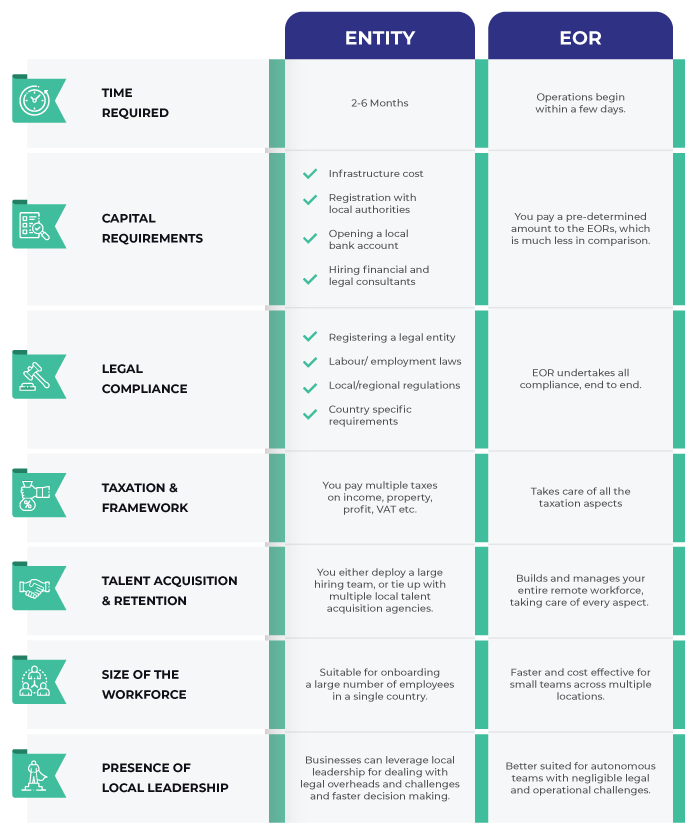Expanding businesses globally has become an essential rather than an optional step. Nevertheless, creating a new entity in a foreign country is a complex undertaking that demands dedication and thorough planning centered around a comprehensive business strategy, infrastructure, employment regulations, compliance, and regulatory frameworks over the long term.
Less than 25% of US-based companies that expand globally are successful, mainly because they do not understand the local laws of the country they enter. Naturally then, the first step is to decide the most efficient and the most secure way to enter this uncharted territory.
Every company that decides to explore cross-border expansion has two routes:
Setting up an entity
This is the traditional way of expansion, where a company sets up a legal entity in new geography in the form of a foreign branch or subsidiary. Setting this up from scratch requires multiple steps that can take anywhere between a couple of months to over a year. To lay the foundation for their new business, the most important steps include getting the entity registered with the country’s local authorities, opening a local bank account, consulting with a team of local legal, financial, and HR consultants, ensuring compliance with tax and statutory laws, and recruiting their team.
Employing an EOR
By partnering with an Employer of Record, you don’t need to have a legal presence in the country. An EOR is a third-party organization that specializes in handling all the legal and operational requirements of building a global workforce for its client companies. They manage the hiring, payrolls, taxation, benefits, and legal compliances for this new branch, relieving the company of the time and risks of doing it all themselves.
Picking the right fit
Every company deals with its own set of requirements and restrictions, which is why there is no one-size-fits-all solution when it comes to global expansion. The trick is to find the expansion model that works best for you.
Here are some key questions companies need to ask themselves:
1. What is the purpose behind setting up operations in a foreign country?
Is it for entering a specific market long term, or getting access to certain resources that are available exclusively at a particular place? If yes, then setting up an entity might be a better option for you, keeping in mind that most countries offer a wide range of tax benefits and write-offs in the case of foreign direct investment.
However, if your reason for expansion is to tap into the talent pool of a specific country, or for the completion of a short-term project in a new country, then an EOR could be a more viable option.
2. What is the amount of capital that you are prepared to invest?
One of the biggest considerations when setting up a subsidiary or foreign branch is the money that you will have to invest. Take into account estimates for the costs of a physical structure/address, registering with local tax and labor authorities, opening local bank accounts, setting up payrolls, and linking up with the correct official authorities. Seems like a handful? Now add the cost of liaising with specialist tax consultants and employment lawyers, as you will have to constantly stay in touch with them. Finally, that leaves us with the recurring cost of maintenance and winding up (if things don’t work out). These costs will be significantly lower in the case of an EOR. Being in the business of setting up and managing global teams, an EOR will have in-house financial and legal consultants, as well as experienced personnel to manage the various aspects of talent acquisition and retention.
3. Are you committed to establishing a long-term presence in the new geography?
If you are confident that entering this market is the right decision for the business, or if the business already has a roster of loyal contractors in the chosen country, entity setup can be a worthy commitment. Most countries want to increase foreign infrastructural investments and therefore offer numerous tax exemptions to companies setting up their foreign branches. On the other hand, if you’re still weighing your options, or want to set up this new foreign branch only for a short-term project, then entering through an EOR would be a safer bet.
4. What is the timeline to begin operations?
If you are certain that you want to establish a firm presence in the foreign market and set up a base for years to come, then establishing an entity might give you better returns in the long run. However, setting up an entity can take anywhere between 3-12 months, depending on how investment-friendly the local legal regime is. Alternatively, if your presence on foreign soil is for a limited period of time – like a special project for a third party, completion of a time-bound goal, or if you want to test the waters before a full-fledged investment, then the EOR route is better suited. With an established base in the desired country, the EOR enables you to start operations almost immediately.
5. What is the desired size of the workforce?
The size of your team plays an important role in determining the route of expansion. When it comes to hiring and onboarding a limited number of employees, an EOR will certainly prove to be faster and more cost-effective. EORs have their own set of trained experts who can handle these processes, thereby reducing the client’s resources and simultaneously empowering them to focus on other aspects of the business. On the other hand, in the case of larger teams in a single country, having its own foreign entity enables companies to operate without any restrictions, while facilitating faster decision making.
6. Would the business benefit from the presence of local leadership?
Companies today rely on employees around the world, especially in leadership roles to leverage their diversity and local expertise to gain a competitive edge. In the case of an entity setup, businesses can leverage the presence of local leaders to effectively navigate the complex legal overheads and challenges when entering a new market. Conversely, if your new workforce does not require regular high-level decision-making, then choosing an EOR would be favorable.

To sum it up
Whether a company decides to set up a new legal entity or enter a foreign country with the assistance of an EOR, there exist certain advantages and limitations in both these routes. If the agenda behind the international expansion is the establishment of a definite physical and legal presence for a long period of time, then setting up an entity would be favorable. However, if a company wants to expand quickly and in a short duration of time, then taking the assistance of an EOR is immensely beneficial and cost-effective.
We hope that this blog post has been able to give you a holistic view of all the factors that weigh in on your decision; should you want to dive deeper, our team of consultants would be delighted to assist you with more information. At Talent500, we are helping global companies hire, build and manage global teams in 50+ countries by acting as their Employers of Record. We aim to transform high-impact companies by giving them access to a worldwide community of highly skilled professionals transcending geographical boundaries. Sign up here to take your first step towards global expansion!






Add comment